Honestly, the less said about “Fire” the better, but “Beyond the Sea” makes up for it and then some so let’s hurry and get to that.
Fire
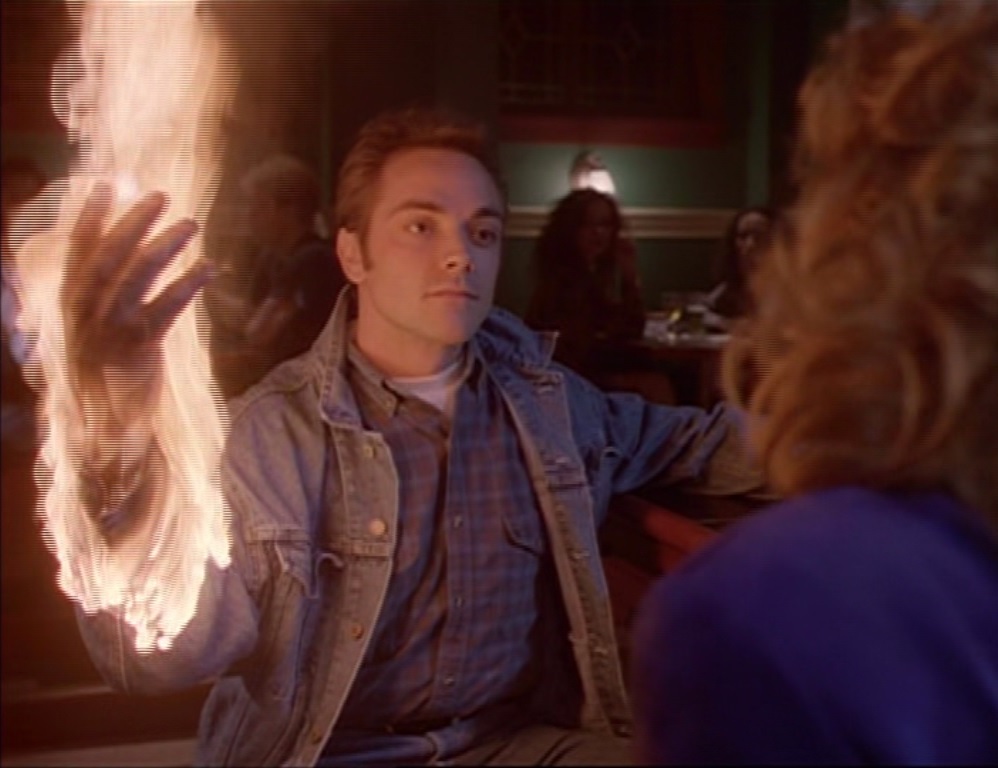
This girl is on FI-AH
Lads, look. No one in Ireland says “top of the morning to you.” Ever. EVER. I cannot emphasise this enough. If you ever visit our cheerfully rainy shores, just say “good morning” or “hello” or “how’s the craic” like a normal person.
Another thing: Mark Sheppard’s in this as the big bad. My pop culture senses advise me that fandom has a thing for this guy. I don’t get it. I found him intensely irritating in Supernatural and only marginally less so in BSG, and his being involved in this car crash of an episode only adds insult to injury.
OK, maybe I’m overstating things. The idea (pyrokinesis) was cool enough; the execution (Mulder assisting an old – ha! – flame in the investigation of a series of bizarre arson attacks against members of the British aristocracy) something else. At one point, Scully comes upon her partner engaging in awkward PDA with his ex and sighs demonstratively. I tried to capture a gif of this and didn’t succeed, but suffice to say it would have summed up the episode.
So this old flame of Mulder’s, Phoebe Green, is a detective with Scotland Yard. She has accompanied the well-to-do Marsden family to the US as Sir Marsden is a possible target of the arsonist’s. She leaves a tape with an outline of the murders thus far (including one from the opening scene, where a well-to-do gent is burned up in his front garden) in Mulder’s car and then pounces on him when he starts to play it. They embrace and Scully looks like she’s going to be sick. I don’t want to be that fan, but Phoebe is genuinely the most annoying thing ever. She and Mulder share some sort of history that simply cannot be as dramatic or sweeping as their exalted declarations make out, even if it does manage to completely neuter Mulder’s professional judgement and make him act like an imbecile for most of the episode. Under normal circumstances I’d find it adorable to picture him acting like a loved-up puppy, but not when the object of his misplaced affections is as manipulative and ineffectual as this.
Anytoot, being a good sport (may as well homage the clichéd dialogue from the off, friends), Mulder agrees to run the case past the Bureau’s arson expert. Agent Bailey is one of the good things in this episode – he’s adorably fascinated with fire and reminds me very much of this wonderful physics teacher I saw in a documentary on string theory. (Said teacher was absolutely entranced with the implications of quantum mechanics. It was marvellous.) Bailey says there would have to be an accelerant for the victims of the attacks thus far to have burned up so rapidly, but no trace of one was found on the bodies. This is enough for Mulder to bring up pyrokinetics – people who can supposedly create and control fire with their minds. In fairness, Bailey doesn’t rule it out, but he also says he’s never seen fire defy the laws of physics, so it might be a tad unlikely.
A little backstory: Mulder is apparently deathly scared of fire. I’m guessing this will come up again, cos it doesn’t serve much purpose in this episode other than to convey how uncaring Phoebe is in asking for his help on the case. Scully asks why she’d expect him to “walk through fire” knowing his aversion to it (the result of a childhood incident where a friend’s house burned down), to which he grimly replies “Phoebe is fire.” Not for the last time in this recap, I’m going to reach for a gif.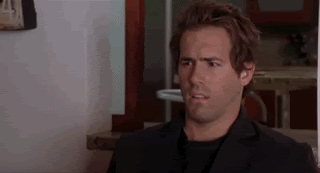
Yeah. W0t.
Meanwhile, our culprit (Sheppard) is posing as the caretaker of the Marsden family’s Cape Cod holiday home. We saw him set fire to the victim in the opening scene with nothing more than an incline of the head. His name will eventually turn out to be Cecil but he goes by Bob for most of the episode, and he’s buried the actual caretaker in the back garden. Seems a little silly to bury the guy’s body on the property, but Bob’s a strange one. He greets the Marsdens when they show up and then goes into town, where he sets fire to a bar in dramatic fashion.
The next day, Phoebe and Mulder interview one of the survivors. She’s reluctant to say much at first as she lives with someone who thinks she was at school the night before, when in fact she was at the bar. Mulder gives her some space and gently asks her to consider coming down to the Bureau to work with a sketch artist. I like little asides like this, because they reveal a great deal about his character. He’s calm and understanding and very considerate with people, which makes it all the more mystifying what he ever saw in Phoebe. She’s very highly-charged and keeps making reference to their youthful indiscretion. Girl, it’s been like ten years. You gotta let that go. It’s not normal to still be this fixated on a college romance when you’re (presumably) in your thirties.
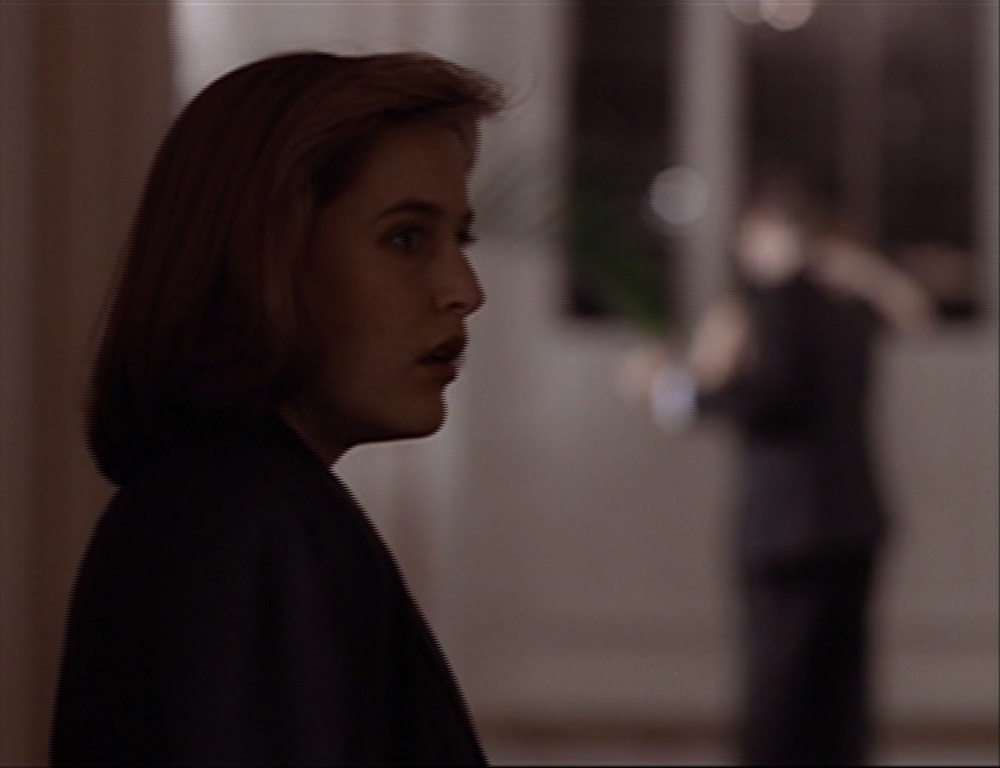
Accompanied by heavy aggravated sigh.
She makes a big show out of the fact they’re accompanying the Marsden family to a party in Boston later that night, particularly the fact she and Mulder are staying in the same hotel. When Scully (who’s been busy doing some actual work in the background) calls him later that night and says she wants to come up to brief him on something, he seems almost put out and says he expects to have his hands full. This calls for another gif.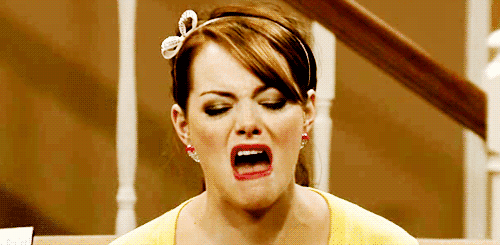
Elsewhere, Bob has been poisoning the Marsdens’ driver/bodyguard, so the family ask him to drive them to the party. He’s only too happy to oblige. Scully later sees him skulking about the hotel lobby, but that’s after she shows up to find Mulder and Phoebe engaged in awkward dancing and PDA. Her face speaks for us all –
– but hey, at least she was spared this exchange:
Mulder: “Doesn’t look like your arsonist is going to put in an appearance.”
Phoebe: “Doesn’t mean there won’t be any fires to put out.”
ANOTHER GIF IS NECESSARY.

This beautiful love scene is interrupted by an actual fire breaking out on the 14th floor, and because Scully’s the only one actually doing her job in this episode she’s the first to notice. She raises the alarm and Mulder, possibly feeling slightly guilty over how useless he’s been, rushes upstairs. The Marsdens’ two little boys are sleeping on the 14th floor. When he arrives the place is filled with smoke, and he collapses – possibly from fear more so than being incapacitated – before he can reach them. Bob actually gets them out before the fire crews arrive and is promptly celebrated by all and sundry. Neat way to get the cops off your back, though his evil scheme is still a-brewing.
The next day, Mulder’s recovering (alone) (sucks for him) in his hotel room when Scully comes in to finally bring him up to speed. The information she dug up is only the fecking solution to the entire case, and Mulder was too busy playing love’s young dream the night before to hear her out. She prepared a profile of the arsonist which noted that, as all the victims were killed close to their homes and families, the killer must have intimate access to their lives. She therefore pulled a list of all the help employed by the victims and ran them through Interpol and immigration databases. One name popped – Cecil L’Ively, which brought up a child murdered in a Satanic cult ritual in the 1960s and a name on a list of recent visas issued by the UK government. L’Ively’s passport was stamped by US immigration officials in Boston two weeks earlier. Ding ding, Dana’s saved your arse. Again.
Mulder does swing into action at this juncture, thankfully, and goes to warn Phoebe and the Marsdens. Scully calls HQ to get the composite sketch of the arsonist from the bar fire. She recognises it immediately as Bob but there’s some confusion as she thinks he’s the family’s driver, having seen him at the hotel the night before. It isn’t until she reaches the Marsdens’ house that they twig it’s not their driver (who is subsequently discovered burned to a crisp in the upstairs bathroom) but the caretaker. Unfortunately, Bob’s been taking advantage of his fake position to redecorate the house using accelerant-laced paint. He lights up the place, starting in an upstairs bedroom. As a further example of how brainless everyone is in this episode, there’s a 10-15 second sequence during which the two adult Marsdens, Phoebe, Scully, and Mulder all stand and stare at a set of burning curtains. They’re on fire, lads. Maybe you might wanna, I dunno, collect your kids and get out of the house?
Of course, the kids are behind a locked door on another floor. Mulder does actually manage to rescue them, while Phoebe does something halfway useful and throws the can of paint/accelerant over Bob when Scully corners him on the stairs. He then appears to set himself alight and stands burning in the front garden, laughing maniacally and shouting that you can’t kill him because you can’t fight fire with fire. Er, yeah. Something like that.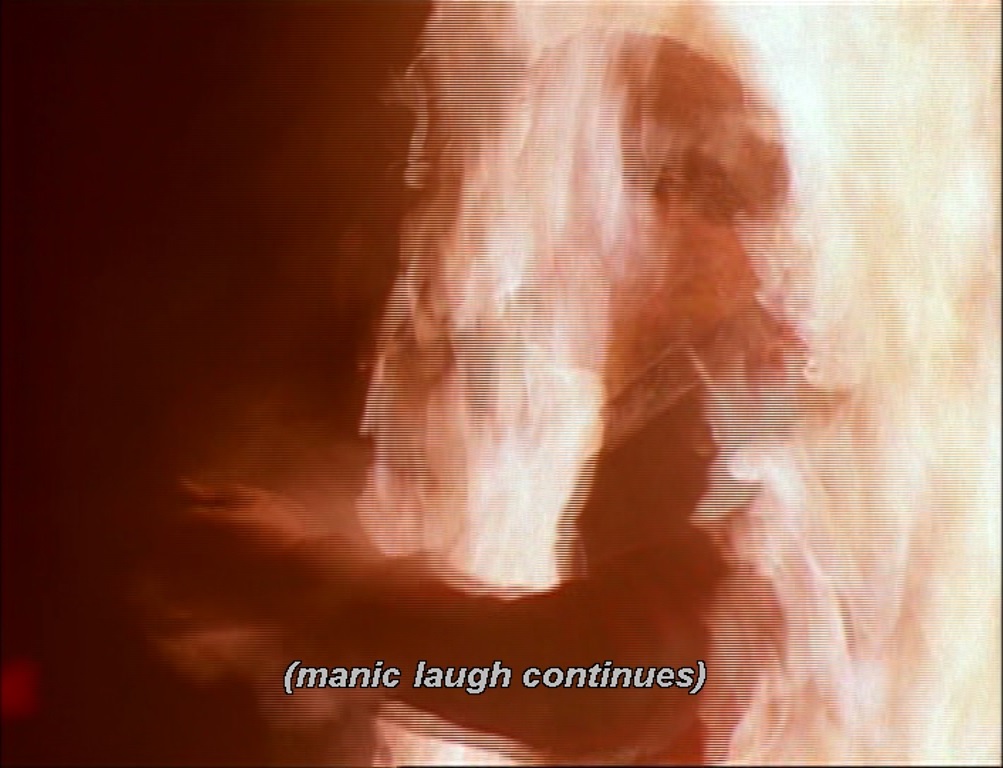
At least, given the consistent levels of cringe in this episode, it ends on an appropriate note of unintentional hilarity.
Beyond the Sea
Now THIS was an episode. A deliberate and very careful advancement for Scully, which gives us some very welcome insight into her personal history. We haven’t had much of that thus far. We can surmise lots about her professional demeanour from her behaviour around Mulder and consistently shrewd decision-making, but this gives her a glimpse of her family life and relationships. In particular, it reveals a sense of uncertainty and guilt over her choice of career – something which dismayed her parents and makes her all the more determined to prove herself, particularly to her father. It is his death in the opening scenes which acts as the focal point for the episode.
The fallout from William Scully’s death unfolds in tandem with an investigation into a serial killer named Luther Boggs. Boggs is a serial killer on death row whom Mulder helped to put away years ago. He’s implicated in a kidnapping case after exhibiting suspicious levels of familiarity with the case, something Boggs himself claims is a result of psychic powers. The most striking aspect of “Beyond the Sea” is its reversal of Mulder and Scully’s traditional roles – for most of the episode, she acts as insistent believer, while he is convinced from the off that Boggs is faking in an attempt to evade execution. It’s telling that it takes personal trauma to upend Scully’s rational judgement, but then again the episode doesn’t really draw a firm conclusion – the characters make up their own minds, but the scenes we see of Boggs by himself suggest things may not be as clear-cut as they seem.
Brad Dourif plays Boggs. Does he ever NOT play a creep?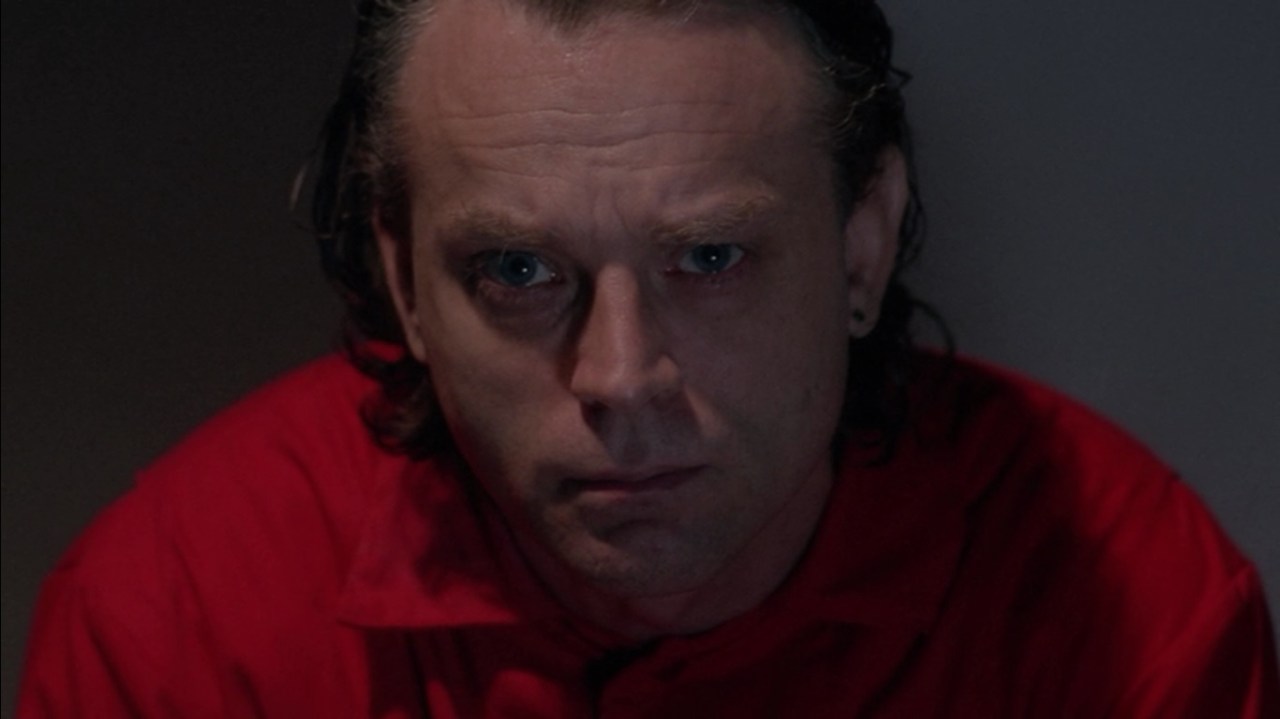
In the opening scenes, Scully’s parents visit her for Christmas. She and her dad call each other Starbuck and Ahab in reference to characters from Moby Dick. She seems strangely formal even with her parents, though this might be something of a natural consequence of having a parent in the military. After they leave, she naps on the couch but wakes up in the middle of the night to the sight of her dad sitting across from her in an armchair. He doesn’t say anything, sitting in silence with a distressed look on his face. She then gets a call from her mum, informing her that her dad has just passed away after suffering a heart attack. When she looks back at the chair her dad is gone. It’s eerie.
After the funeral, her dad’s ashes are scattered at sea. Scully observes that as her father was a naval captain, he would have been entitled to a full ceremonial burial at Arlington cemetery, but her mother says the smaller ceremony is what he wanted. Her devotion to formality even in the face of bereavement is rather poignant. I get the impression that burial at Arlington, to her, represents an overt acknowledgment of heroism and achievement, which is obviously important given her father’s long career at sea. But for her to bring it up at a funeral which he requested be more personal and low-key seems to speak to some kind of lingering concern about inadequacy – it’s as though she feels the need to be doubly good at her job to justify having chosen the Bureau over medicine, and the symbolism of the ceremonial funeral proves the validity of that decision. I might be massively overanalysing here, but then Scully does ask her mother if her dad was proud of her. Her mum replies, “he was your father”, which is presumably intended as a self-evident acknowledgement that he’d have been proud of her no matter what. At this point though, it comes across as ambivalent, possibly in keeping with Scully’s stricken state of mind.
She is distinctly unmoored throughout. Mulder is assisting on the kidnapping case and tells her to take some time, though she is adamant that she wants to keep working. However, every time she’s around Boggs he attempts to manipulate her. She sees her dad sitting in the chair instead of him at one point. He starts humming “Beyond the Sea” (which played at her parents’ wedding and the funeral) and asks if Starbuck received his message. At one point, he’s given a piece of fabric purportedly belonging to one of the kidnapped teens and makes a big show of using it to say they’re being held in a condemned warehouse and whipped with a coat hanger. Mulder scoffs and announces that the fabric was torn off one of his own shirts. But Scully, en route back to the motel, starts seeing signs consistent with Boggs’ descriptions and discovers a coat hanger and necklace in an abandoned warehouse. The necklace is IDed as belonging to one of the teenagers.
This leads to some conflict as Scully doesn’t say she was following Boggs’ trail on her report. She only confides this to Mulder after he gets back from interrogating him. Mulder is horrified and more than a little offended – calling in a suspicious warehouse on the basis of psychic testimony is the type of thing the Bureau would expect from Spooky Mulder but not from Dana Scully, and she’s being too proud in refusing to acknowledge that. Scully argues that he should be pleased she’s opened herself up to “extreme possibilities” but he says she should only do so when they’re the truth. Honestly bb, it’s kinda hard to tell the difference. You are completely over-zealous when you believe in something (let’s not forget your Rambo shenanigans last week) and at least Scully’s hunch actually helped them recover something concrete. After a beat, he does calm down and gently suggests that maybe her grief over her father is getting to her, in a sweet illustration of the sensitivity and understanding which underpins all their interactions. Gosh, these two. Even when they argue they do it so adorably you can’t but push your hands to your cheeks and squee.
Later on, Boggs gives them another tip, leading them to a boathouse where they manage to rescue one of the teenagers. Unfortunately, the escaping kidnapper manages to shoot Mulder – right under a bloodstained white cross, exactly as Boggs had predicted. Scully sees this and is knocked for six once again, going straight to Boggs and furiously yelling that if anything happens to her partner nothing will stop her from personally flicking the switch to execute him. It’s hair-raising, not least for how upset she is at the prospect of losing someone else so soon after her dad’s death. As if underlining this, she then briefly sees Mulder in the chair instead of Boggs, before he starts calling her Starbuck again and claiming that he’s intercepted a message from her dad. He won’t deliver it though, not until she gets him a stay of execution. Boggs had been due to be executed once before, but it was called off at the very last minute. He claims his few minutes in the chair gave him psychic powers. He saw the faces of his family – all of whom he murdered one Thanksgiving – and that he felt himself leave his body and drift towards a cold, dark place. Scully retorts that a cold dark place may be waiting for him, but it isn’t for her father and it isn’t for Mulder. This is a loaded line, as it seems like a tacit acknowledgment of faith – she doesn’t believe good people would go to the same place as a hardened killer.
The rescued kidnapping victim IDs the man who took her and her boyfriend. The investigators advise Scully that the suspect is known to them and had previously been suspected of working with Boggs on multiple cases. A judge has rejected any kind of stay on Boggs’ execution, so Scully decides to bluff and claim she’s gotten one for him. Boggs tells her where he thinks the kidnapper is holding the other victim. As she leaves, he says that he knew she was bluffing about the stay, but he also knows she tried to get one. He warns her not to follow the kidnapper into “the devil.” As it turns out, the kidnapper is indeed holding the other victim in the place Boggs named. When the FBI burst in, the kidnapper tries to run and Scully chases him. He runs across a stretch of floor that buckles and collapses under him, plummeting to his death. There’s a mural of a devil on the wall next to it. Scully sees it and gulps.
Now that they’ve rescued the other victim, Scully goes to see Boggs and acknowledges that he may have saved her life. He asks her to come to his execution and says he’ll tell her the message her father had for her there. Tellingly however, she chooses not to. She goes to Mulder and explains her reasoning – having visions of the recently departed is a common psychological phenomenon after bereavement, and if Boggs was trying to get back at Mulder with this whole scheme it would have been easy enough for him to get info on Scully as his partner. Only now does Mulder seem to revert to his usual self – he asks why, despite all the evidence, she still can’t believe. She says she’s afraid to. He asks why she couldn’t face that fear, especially as it means she may never know what her father wanted to tell her. Her response now is telling – she already knows what the message was, because he was her father. It’s clear that this is meant to be a resolution, deliberately distinguished from the way the line was framed earlier.
But here’s the thing: despite Scully (and Mulder)’s belief that Boggs was faking, when we see him being given his final meal and put in the chair for execution, he does see his dead family watching him. It’s probably not a stretch to say that psychologically, a murderer seeing the faces of his victims as he’s led to his execution makes perfect sense, but the episode holds off on overtly linking Boggs with the actual kidnapper. It’s far more open-ended than either of our heroes would have you believe, and Scully’s rather sudden disgression to skepticism smacks of a need for personal closure than proper resolution. That’s understandable given the circumstances, but it’s interesting to me that she chose the rational explanation in this case, because there isn’t a clear-cut reading of it.
I liked this episode a lot, so I did some Googling. Apparently the writers wrote this precisely because they felt they hadn’t fleshed out Scully’s character enough over the course of the season. They also had to fight to get it screened, because telly execs were clearly as clueless then as they are now. Awesome stuff. I really hope the seeds of doubt planted by this episode come to fruition in later seasons. Oh, and I almost forgot – this happened when Mulder was comforting her after her dad died.
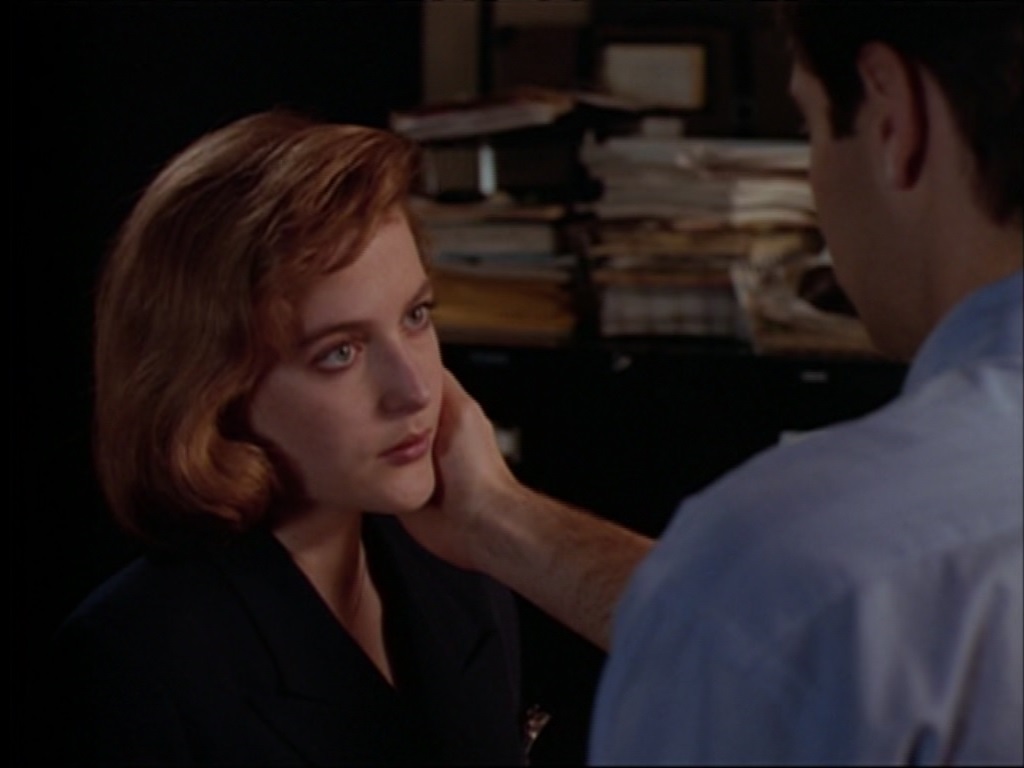
Shipping feels remain activated.
SIGH.
Grace Duffy is a pop culture devotée and sometime film critic currently catching up on her classic sci-fi. You can read more on her blog, Tumblr, or catch her frequent TV liveblogs on Twitter.
—Please make note of The Mary Sue’s general comment policy.—
Do you follow The Mary Sue on Twitter, Facebook, Tumblr, Pinterest, & Google +?



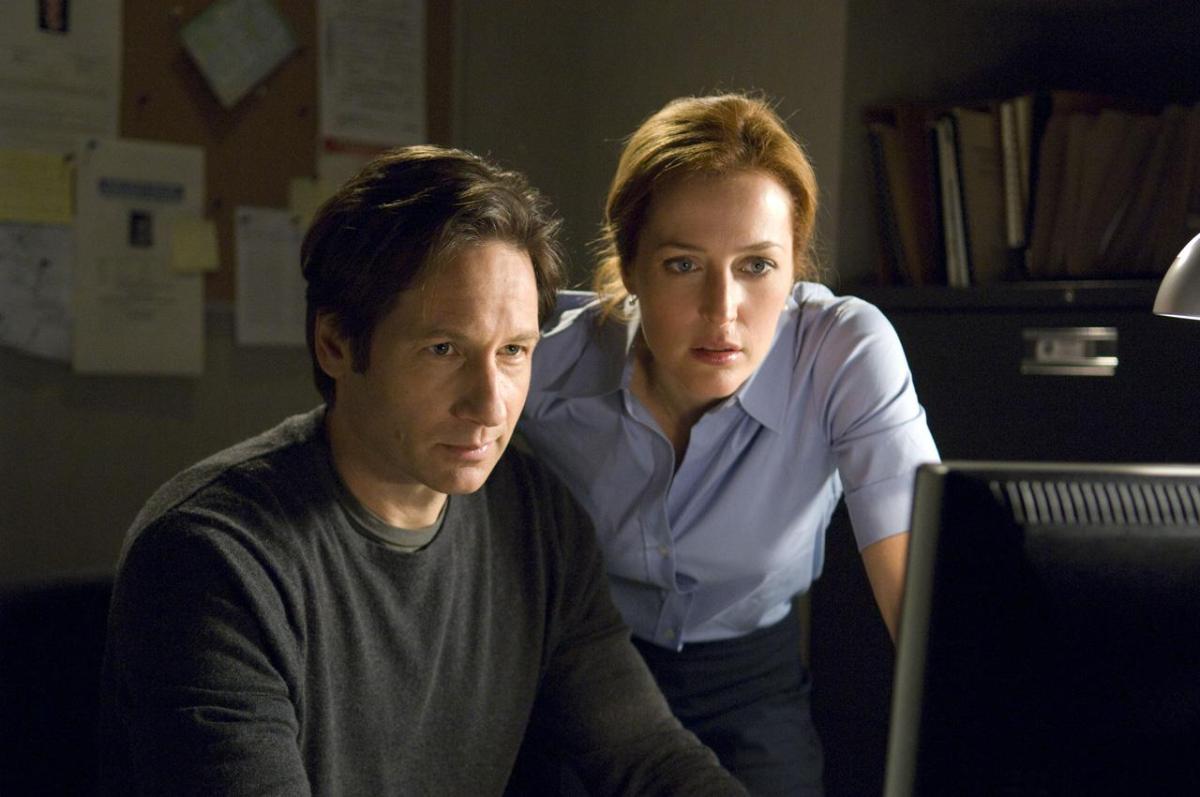





Published: May 11, 2015 07:00 pm